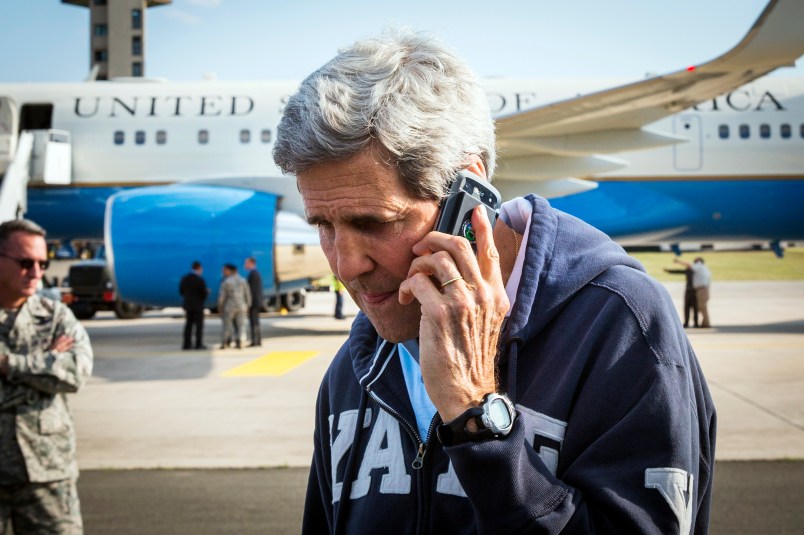JAKARTA, Indonesia (AP) — U.S. Secretary of State John Kerry said Monday the Obama administration decided to airdrop weapons and ammunitions to “valiant” Kurds fighting Islamic State extremists in the Syrian border town of Kobani because it would be “irresponsible” and “morally very difficult” not to support them.
Speaking in the Indonesian capital, Kerry told reporters that the administration understood ally Turkey’s concerns about supplying the Kurds, who are linked to a Kurdish group that Ankara fiercely opposes.
But, he said the situation is such in the besieged town of Kobani that the resupplies were deemed absolutely necessary in a “crisis moment.”
“Let me say very respectfully to our allies the Turks that we understand fully the fundamentals of their opposition and ours to any kind of terrorist group and particularly obviously the challenges they face with respect the PKK,” Kerry said. “But we have undertaken a coalition effort to degrade and destroy ISIL, and ISIL is presenting itself in major numbers in this place called Kobani.”
An insurgent group, the Kurdistan Workers’ Party, or PKK, has fought a three-decade war, initially for independence and later for autonomy and greater rights for Kurds. The conflict with the PKK has killed tens of thousands of people since 1984. Turkey and its U.S. and European allies consider the Marxist PKK a terrorist organization for killing civilians in urban bombings.
Kerry said the militants had chosen to “make this a ground battle, attacking a small group of people there who while they are an offshoot group of the folks that our friends the Turks oppose, they are valiantly fighting ISIL and we cannot take our eye off the prize here.”
“It would be irresponsible of us, as well morally very difficult, to turn your back on a community fighting ISIL as hard as it is at this particular moment,” he said.
The U.S. military said Sunday it had airdropped weapons, ammunition and medical supplies to Kurdish forces defending the Syrian city of Kobani against IS militants.
The airdrops were the first of their kind and followed weeks of U.S. and coalition airstrikes in and near the town not far from the Turkish border. The U.S. said earlier in the day that it had launched 11 airstrikes overnight in the area. Central Command said its forces have conducted more than 135 airstrikes against Islamic State forces in Kobani.
President Barack Obama called Turkish President Recep Tayyip Erdogan on Saturday to discuss the situation in Syria and notify him of the plan to make airdrops, one administration official told reporters. He would not describe Erdogan’s reaction but said U.S. officials are clear about Turkey’s opposition to any moves that help Kurdish forces that Turkey views as an enemy.
The airdrops are intended to be temporary and the U.S. has asked Turkey to allow Kurdish fighters from Iraq into Kobani to help, Kerry said.
Turkey’s Foreign Minister said Monday that his country is helping Iraqi Kurdish forces cross into Kobani “to give support” to fellow Kurdish fighters defending the Syrian town against Islamic State militants.
The comments by Mevlut Cavusoglu at a news conference in Ankara followed the announcement by the U.S. military that it had airdropped supplies to the Kurdish forces in Kobani.
In a conference call with reporters after Central Command announced the airdrops, senior administration officials said three C-130 planes dropped 27 bundles of small arms, ammunition and medical supplies.
One official said that while the results of the mission were still being assessed, it appeared that “the vast majority” of the supplies reached the intended Kurdish fighters. That official also said the C-130s encountered no resistance from the ground in Syria during their flights in and out of Syrian airspace. The officials spoke on condition of anonymity under ground rules set by the White House.
One of the administration officials said the airdrops should be seen as a humanitarian move. He said U.S. officials believe that if Kobani were to fall, the Islamic State militants would massacre Kurds in the town.
Another administration official said “you might see more” U.S. resupply missions to benefit the Kurdish fighters in Kobani in the days ahead. Yet another administration official said a land route to resupply the Kurds had been under discussion but would require Turkish cooperation. He said talks on resupply needs and means would continue.
___
Burns reported from Washington
Copyright 2014 The Associated Press. All rights reserved. This material may not be published, broadcast, rewritten or redistributed.






